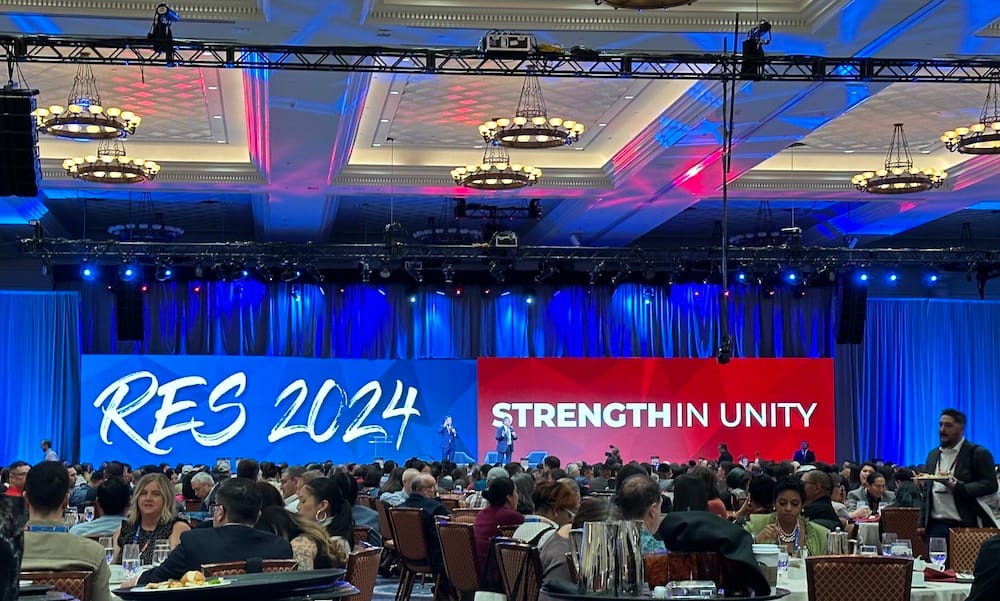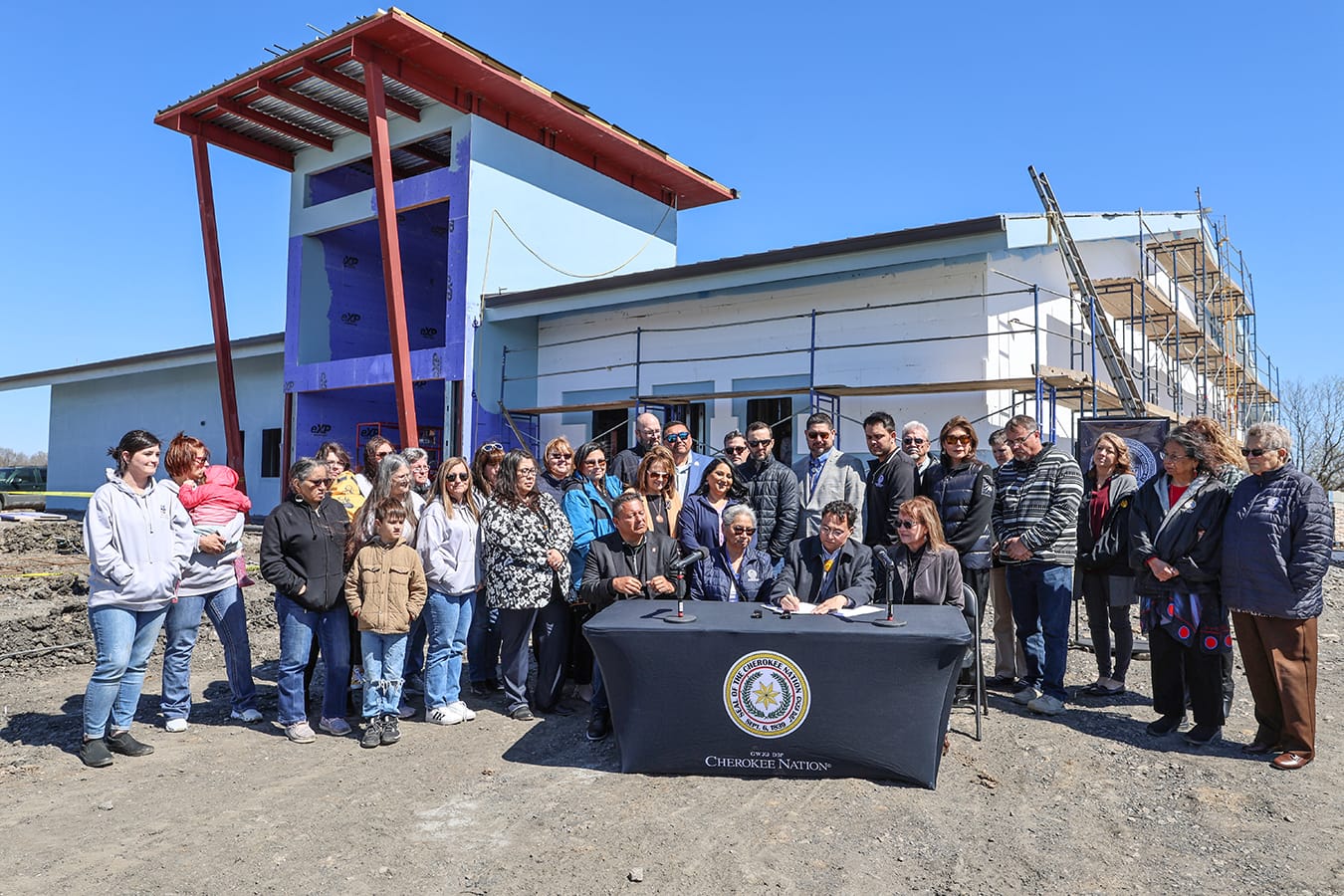

U.S. Treasurer Chief Malerba gives keynote at Tribal Energy Equity Summit

Tulsa, OK - Chief Lynn Malerba, the Treasurer of the United States delivered a keynote address yesterday at the Tribal Energy Equity Summit at RiverSpirit Casino in Tulsa, OK. Chief Malerba, who became the 18th chief of the Mohegan tribe on August 15, 2010, and is the first female chief in the tribe's modern history. The position is a lifetime appointment.
Chief Malerba explains her role in this position, “As treasurer, it is my privilege to host tribal consultations, visit with tribal delegations and organizations and visit with Indian country to hear about your successes, your challenges and your barriers to achieving full self-sufficiency. And it is a new day in Indian country. As I think about this summit, what I think about most are our tribal values. And you know, we've talked a little bit about that. And each tribe in what is now called the United States has a different history, and a different culture, which contributes to the richness of not only our own communities, but our surrounding communities as well.
She talks about the process of educating the federal government, “how do we educate our federal partners to make sure that they're being good federal partners? And how do we educate them to understand that each tribal community is unique, it's different, and we need to respect their opinions. But what we do have in common are our tribal values honoring our Mother Earth. As I've said, I'm only taking what we need from this land to conserve our resources for future generations, gathering our medicines from our indigenous lands to heal ourselves walking lightly on this earth to ensure that we do not do damage to our natural resources, ensuring that all we do incorporates the lessons that we've learned by observing nature, and observing the natural world and more.
For decades, Tribes have faced unprecedented climate impacts. Such as tribes having to relocate whole villages due to sea level rise, the ability to hunt. Reliability of power grids during severe storms interrupting their ability to power their homes, interrupting their ability to access urgent, urgent needed health care, interrupting access to public safety among other issues. Imagine not being able to call 911 or having your call from 911 routed to an outside agency rather than your tribal police because your grid is so unreliable and then not getting the assistance that you need.
The statistics of an electrified homes in Indian Country is close to 17,000 homes or otherwise noted at 14% of all tribal homes, which is probably undercounted, the COVID pandemic illustrated the inequity that tribal communities face during the lack of electricity due to the lack of electricity, the lack of reliable broadband access, which is estimated to be 20% of all tribal homes. Tribal communities struggled to share public health strategies, educate their children and work from home.
Tribes are embracing renewable energy as one key to a sustainable future. It is estimated that 6.5% of all renewable energy is on tribal land.
Chief Malerba asks, “how do we unlock the key to all that energy? We know the issues around energy inequities centered around costs interconnectivity, lack of outside investment due to the desire for high returns on it on that investment. Lack of access to capital is specifically pre-development capital. And I think that that's where we really need to focus our efforts on and lack of access to what once was our lands, which are now either adjacent to our lands or in a checkerboard status. Tribes are seeking not just ownership, but sovereignty about how best to provide renewable energy for their communities, understanding the unique attributes of their communities and the unique needs that they have. This is not simply about energy. This is about the exercise of self-governance, the ability to employ our tribal people in good paying jobs, and the reduction of economic strain for our tribal households by lowering energy costs.
There are multiple offices and bureaus within Treasury that are working on renewable energy program components, the inflation Reduction Act implementation office, the climate hub, the Office of Tax Policy, and the IRS, in consultation with our Office of Tribal and Native Affairs, and in consultation with tribes as guidance is proposed. It is estimated that over 100 Tribal leaders and tribal representatives participated in a consultation focused on a new credit delivery mechanism elective pay, often called direct pay.
That enables tribal governments to take advantage of clean energy tax credits, expanding the reach of those credits to help projects more quickly and affordably. And which will in turn create good paying jobs and lower energy costs.
Last year, an executive order was signed by President Biden at the White House Tribal Nations Summit. It acknowledges the challenges that tribe's space when exercising their tribal sovereignty, and the myriad funding sources, challenges and accompanying processes. This has over 2000 grant opportunities. In addition to all of the other programs that tribes administer.
Chief Malerba concludes, “That is my role, to work with all of the offices within treasury to make sure that we can get to the Yes. And I think that that's so important, because it's important to our communities, whether it's energy or any of the other programs that we're working on. We need to get to the yes; we need to serve our Native nations. Native nations have waited a long time to be at the table, we're at the table. And we should embrace this opportunity in every way.”

Unity & Opportunity: Record crowd gathers at 2024 Reservation Economic Summit

LAS VEGAS — More than 4,500 attendees packed the Reservation Economic Summit (RES) in Las Vegas last week, breaking previous participation records.
Organized by the National Center for American Indian Enterprise Development, the four-day event tackled non-gaming economic development in Indian Country, emphasizing collaboration under the theme "Strength in Unity."
The 2024 summit brought together tribal leaders, federal officials, tribal enterprise executives, Native entrepreneurs, and several Indigenous celebrities from the film, television and fashion worlds.
More than 500 speakers participated in more than 100 sessions, including business development workshops, matchmaking events, and educational panels. The “Buy Native” matchmaking program connected small Indigenous businesses with potential buyers from government agencies and major corporations.
Chris James, CEO of The National Center, highlighted the importance of unity in his address to the attendees. “We all have a pretty good understanding of what strength is, but let’s reflect on the concept of unity. It’s more than just a word, it’s a force,” James said, emphasizing collective endeavors as the key to achieving lasting success, drawing upon historical examples of Native American triumphs.
Federal participation at the Summit was significant, with agencies leveraging the event to announce nearly a quarter-billion in funding for small-business lending, clean energy, tribal broadband and water infrastructure. Senior federal officials including Agriculture Secretary Tom Vilsack, U.S. Treasurer Chief Marilynn Malerba (Mohegan), and Department of Interior Assistant Secretary Bryan Newland (Bay Mills) spoke to attendees during general sessions.
Administrators from two federal agencies heavily involved in Native contracting — the U.S. Small Business Association (SBA) and the General Services Administration (GSA) — addressed attendees during fireside chats with The National Center’s James. SBA Administrator Isabel Casillas Guzman and GSA Administrator Robin Carnahan also took time to speak one-on-one with Tribal Business News about growth in federal contracting among Native-owned businesses, as well as looming threats that could derail that growth.
The agenda prioritized access to capital, federal contracting opportunities, and clean energy solutions. Additionally, in-depth sessions covered accounting, finance, and marketing, providing attendees with opportunities to earn continuing professional education (CPE) credits.

Cherokee Nation expands landmark Verna D. Thompson Early Childhood Education Act

Updated legislation provides $80M investment for tribe’s Head Start program
NOWATA, Okla. — Cherokee Nation Principal Chief Chuck Hoskin Jr. signed into law the reauthorization of the Verna D. Thompson Early Childhood Education Act on Monday, March 18, at a ceremony held at the construction site of the new Cherokee Nation Head Start Center in Nowata. The updated legislation provides $80 million in funding to support the replacement of aging early childhood education Head Start centers across the Cherokee Nation Reservation.
“The Verna D. Thompson Early Childhood Education Act has enabled us to design and now build world class early childhood education facilities worthy of the Cherokee children who attend Head Start, worthy of our wonderful staff and worthy of the families who entrust their children to our care,” Chief Hoskin said. “By amending and expanding this landmark legislation, we reaffirm the Cherokee Nation’s commitment to investing in the future of our people through education from the earliest years. Since its initial signing, the Cherokee Nation has made great progress in improving its early childhood education facilities and services, and we look forward to the day all of our Head Start programs are in new state-of-the-art facilities.”
The amendment and expansion of the 2021 law was signed after the Council of the Cherokee Nation recently approved Chief Hoskin and Deputy Chief Warner’s proposal to double the tribe’s investment in Head Start construction from $40 million to $80 million to replace or rehabilitate all of the tribe's Head Start centers with new, state-of-the-art facilities.
Deputy Chief Bryan Warner noted the positive impacts of the act in recent years and the importance of the ongoing investments.
“This act not only makes building state of the art early childhood education facilities possible, it sends a message to the Cherokee people, and the world, that Cherokee Nation is committed to the great cause of early childhood education and to our shared future,” said Deputy Chief Warner. “This reauthorization and our increased investment in facilities ensure we can build upon that success in the years ahead, providing our children with the best possible early learning environments.”
The Early Head Start in Nowata, the venue for Monday’s signing ceremony, is a $7.3 million, 9,300 square-foot facility that is expected to be completed in the summer of 2024. The facility serves as an example of the quality of construction and design that will be seen at the Cherokee Nation’s other Head Start locations across the reservation.
“What better way to invest in the Cherokee Nation’s future than by investing in our children? I think that’s what it’s all about, and I’m proud to say that our Council is in 110% when it comes to this initiative,” Speaker of the Council Mike Shambaugh said. “We could not be happier to support the signing of this act.”
As set forth in the original law, Cherokee Nation will replace all of its Head Start facilities, which serve the following communities:
- Tahlequah
- Jay
- Stilwell (combining two facilities in that area)
- Salina
- Pryor / MidAmerica Industrial Park (co-located with a new Child Development Center)
- Nowata
When first passed in 2021, the Verna D. Thompson Early Childhood Education Act also established a task force to study childcare needs across the tribe’s reservation. The task force identified gaps in various communities where childcare is limited, and the Cherokee Nation helped fill one of those gaps by investing $30 million in a childcare center in Catoosa to serve the Hard Rock Hotel & Casino work force.
Chief Hoskin also called for the reconvening the childcare task force. The task force, under the direction of First Lady January Hoskin, Chief of Staff Corey Bunch and Secretary of State Shella Bowlin, will resume studying the childcare needs of the tribe’s work force and issue a report with its findings.
“I’ve asked First Lady January Hoskin, Chief of Staff Corey Bunch and Secretary of State Shella Bowlin to reconvene the Cherokee Nation Child-Care Task Force to look at two areas of interest,” said Chief Hoskin. “First, what childcare gaps exist for members of the Cherokee Nation workforce and the workforce of our family of companies and other entities and how can we help fill those gaps? Second, the new law authorizes an administrative consolidation of Head Start and our Child Development Center programs, but should we proceed and will a consolidation help us on our mission to provide a safe, loving and intellectually nurturing environment for the Cherokee children in our care.”
In addition to the Head Start construction projects, the Cherokee Nation is also building a new Child Development Center in Sallisaw, upgrading the Child Development Center in Stilwell, and constructing a new facility in Pryor that combines Head Start and Child Development Center services.
“From replacing all of our Head Start facilities to adding new Child Development Centers to our robust childcare subsidy program, Cherokee Nation does a great deal to meet childcare needs of the Cherokee people,” said Chief Hoskin. “However, we cannot be content with where we are, we must remain committed to improving and expanding early childhood education and childcare services across the reservation.”
The Cherokee Nation Verna D. Thompson Early Childhood Education Act is named in honor of Head Start Director Verna Thompson, who has worked for the Cherokee Nation and in early childhood education for 40 years.
“I want to say thank you to Chief Hoskin and his administration, the Council members, the education administration, and the Chief of Staff. They are all tremendous supporters of Head Start,” Thompson said. “I can’t think of anything better than to celebrate my 40th year here with all of the facilities plans and all of the wonderful work I’ve had the privilege to do with such an awesome team.”
Cherokee Nation currently serves over 900 children through its Head Start programs, which were first started in 1978. Cherokee Nation’s Head Start students range from as young as six weeks to preschool age. They are taught cognitive, language, motor and social skills as part of the tribe’s Head Start programs.
Across the country, federal Head Start programs provide comprehensive services to more than 1 million children each year.
2021 court decision cemented Chickasaw Nation's tribal sovereignty.

On March 11, 2021, we mark an important milestone in the work to protect Chickasaw Nation sovereignty: Judicial affirmation of the Chickasaw Nation’s treaty territory as a “reservation,” which is a form of Indian country under federal law.
Immediately following the recognition of the Chickasaw Nation’s reservation, Chickasaw Nation Governor Bill Anoatubby issued a proclamation that declared, in part, that the ruling “set forth what the Chickasaw people have always known … we remain a self-governing Tribal nation.”
Tragic though it was, the catalyst for this heralded event was a court battle involving a heinous crime committed by a non-Native against three Chickasaw citizens in June 2010.
Shaun Michael Bosse, a non-Native, had been earlier convicted for the brutal killings of Chickasaw citizens Katrina Griffin, 24, her son, 8-year-old Christian and her daughter, 6-year-old Chastity Hammer, in Purcell, Oklahoma.
“Our hearts remain steadfast with the family this man victimized,” Governor Anoatubby said at the time, and promised the tribe “will continue our efforts to see justice done for the victim’s family.” Governor Anoatubby followed through on this pledge.
The court battle turned on Mr. Bosse’s attempt to take advantage of the Chickasaw Nation’s sovereignty and the Native status of his victims. He argued that the Chickasaw Nation’s treaty territory was and remains a “reservation,” or Indian country, for purposes of determining jurisdiction to punish his crimes. The court agreed and held that the Chickasaw Nation continues to possess, as a sovereign entity, a reservation that was established by Congress in accord with our treaties and that, as such, it remains Indian country for purposes of criminal jurisdiction. This ruling caused a massive increase in what had been understood to be Chickasaw Nation Indian country, with direct consequence on the reach of Tribal, Federal, and State criminal jurisdiction. Nonetheless, Mr. Bosse’s attempt to evade justice for his brutality by seeking to deprive the Oklahoma court of power over him ultimately failed, and today he remains sentenced to death for his crimes.
Factored into the court’s decision was an earlier case that strongly affirmed basic principles also critical to securing tribal sovereignty, McGirt v. Oklahoma. In it, Seminole Nation citizen Jimcy McGirt argued his Native heritage and the fact his crime was committed on the Muscogee reservation meant the state of Oklahoma did not have jurisdiction.
The U.S. Supreme Court agreed.
The Bosse decision clarified that while the McGirt ruling involved only the Muscogee reservation, its reasoning also applied to the Chickasaw, Cherokee, Choctaw and Seminole reservations.
If there was ever a question about the Chickasaw Nation being a sovereign entity, it was forever put to rest.
The ruling that affirmed the Chickasaw Nation’s reservation, like several others, relied on the U.S. Supreme Court’s earlier ruling in McGirt, which arose in the Muscogee (Creek) Nation’s reservation and offered the Supreme Court’s full-throated affirmation of the continuing vitality of Tribal treaties in this area of the law. Today, including the judicial affirmations of the Chickasaw Nation’s and Muscogee (Creek) Nation’s reservations, courts have recognized eight separate and continuing reservations in Oklahoma. While these rulings offer tremendous support for Tribal rights to self-government and opportunities for the expanded exercise of Tribal sovereignty, they carry also immense responsibilities. And when the Chickasaw Nation turned to rise to those responsibilities, it worked to foster cross-jurisdictional cooperation in the interest of the public’s safety. For example, in executive directives issued March 11, 2021, Governor Anoatubby directed the Chickasaw Nation’s criminal justice officials to work toward “effective, efficient, and durable cross-commissioning of policing services throughout the Chickasaw Nation” as well as appropriate “prosecutorial authorizations to ensure all crimes committed within our boundaries are properly prosecuted and justice is served.”
But that’s not all. To increase the measure of justice available within the Chickasaw Nation system, Governor Anoatubby also called for the expansion of services intended to offer “restorative justice and mechanisms designed to help both victims and perpetrators to return to productive engagement within our community.”
Debra Gee, Chickasaw Nation Chief Counsel in the Office of Tribal Justice Administration, agrees much has changed.
“In 2021, we were working with just one part-time attorney who served as a prosecutor,” Gee said. “In 2021, we moved to being a full-time prosecution office.”
Gee said the department currently employs eight full-time prosecutors. The department, including support staff, now totals 39 employees. Prior to these court decisions, her department averaged approximately 80 prosecutions a year. Prosecutions now average approximately 2,000 a year.
“Once an arrest has been made by either Chickasaw Lighthorse police or a cross-commission officer of the Chickasaw Nation, we are the prosecutors. We file cases that are submitted to us. We’ll have arrestees who come from all parts of the Chickasaw Nation territory,” she said.
Chickasaw Lighthorse Police Commissioner Randy Wesley says his force has seen dramatic changes in recent years to accommodate the increased responsibilities, as well.
“The McGirt decision had a huge impact,” Wesley said. “We had about 65 officers when the McGirt decision was handed down.” Today, he said, that number has increased to 105 officers.
Two other metrics reveal the differences between pre-McGirt and the post-McGirt ruling. Calls for service in 2020 were just more than 24,600. In 2023 that number jumped to 35,750. Community policing events have skyrocketed from 38 in 2020 to 294 last year.
Gee says communication with other law enforcement agencies is key.
“We’ve had to do outreach to law enforcement agencies to let them know our process, which has evolved over time. And even before March 2021, we produced written documents to each of the agencies on how to contact us.
“There are 13 counties, and each of those counties has law enforcement agencies and city police. We have 79 cross-commission agreements, and each of those 79 agencies has officers who write reports and submit those to us.”
More serious crimes are often brought to the attention of the U.S. Attorney’s office where the penalties can be harsher than the three-year limit on sentences a Tribal court can impose for any single offense.
“We work closely with the U.S. Attorney’s office,” Gee said. “We have a tribal special Assistant U.S. Attorney at the U.S. Attorney’s office in the western district who prosecutes in federal and tribal court.”
In line with Governor Anoatubby’s executive directives, imprisonment is not the end of the process. Gee says concentrated effort goes into restoration.
“We’re implementing alternatives to incarceration with our healing to wellness court and our truancy court,” Gee said. “We’re trying to implement alternatives rather than just locking people up and not doing anything to improve their lives or rehabilitating them.
“That is something we are doing in this office as well as working with other internal offices like family services and their mental health team. There are a lot of things still to be done, but we’ve come a long way since 2021.”



